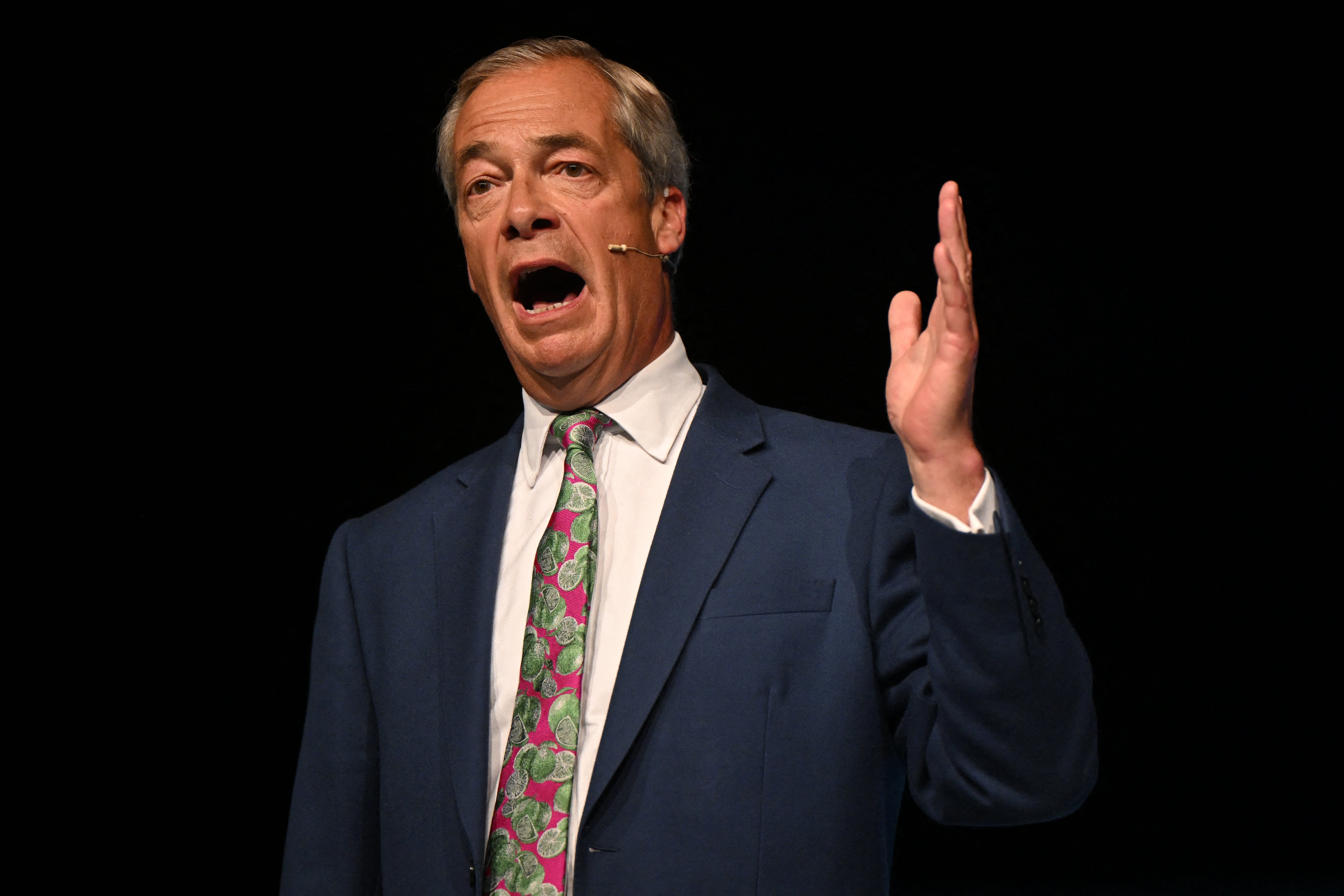The main parties must not let Nigel Farage poison the well of British politics
Editorial: The dangers of the far right have already been demonstrated in Europe – the Reform UK leader must not be allowed to inject those prejudices into our democracy

Nigel Farage is a skilful communicator whose role in securing and winning the 2016 Brexit referendum means he has wielded more influence over the course of British politics than many prominent figures in the established parties.
It seemed he was repeating the trick after returning to the front line to lead Reform UK after Rishi Sunak wrongly calculated that he would sit out the general election. The one big change in the opinion polls was the rise of Reform, mostly at the Conservatives’ expense. But Mr Farage’s party has slipped back after two unforced errors. Firstly, his ludicrous assertion that the West provoked Russia into launching its war in Ukraine.
Secondly, the revelations about the indefensible racist views of some Reform candidates and supporters. Three candidates were disowned by Reform at the weekend for offensive remarks. Mr Farage said “perhaps a dozen” have been dropped and insisted at a rally in Birmingham on Sunday that “the bad apples are gone,” but The Spectator magazine has listed allegations against 18. As ever, he blames someone else: in this case, a vetting company paid £144,000, which he claims did not do its job.
The most damaging allegations came from Channel 4 News, which went undercover on Mr Farage’s campaign in the Clacton constituency. Andrew Parker, a volunteer canvasser, was filmed suggesting that army recruits should shoot migrants arriving on British beaches as target practice and called Mr Sunak a “f***ing P***.”
Mr Farage has called this “the biggest smear stitch-up I have ever seen”, pointing to Mr Parker’s work as an actor (though Mr Parker, who has apologised for his remarks, says his main job is in property). Channel 4 News said it did not pay Mr Parker and stands by “our rigorous and duly impartial journalism which speaks for itself”. Its strong reputation for such reporting is beyond doubt.
The Reform leader declined to appear on the BBC’s Sunday with Laura Kuenssberg programme because the corporation did not apologise for what he called a “rigged” audience when he appeared on Question Time on Friday. The BBC insists the audience represented a mix of views.
Like his friend Donald Trump, Mr Farage likes to play the victim of conspiracies against him. He claims he “destroyed” the fascist British National Party but admits some of its supporters have rallied behind Reform because they have nowhere else to go. He professes to be “colour blind,” and yet he wants to abolish anti-discrimination laws.
As with Mr Trump, some of his followers will believe his conspiracy theories, but they are fanciful. Mr Farage is not as innocent as his cheeky chappie act suggests. He has fanned the flames of prejudice and turned a blind eye to intolerable statements by Reform supporters and candidates until media disclosures forced his hand. His mask slipped when, after Mr Sunak left the D-Day commemorations early, Mr Farage said it “shows the man doesn’t understand. He is not patriotic, he doesn’t care about our history, our culture.”
The prime minister was right to hit back powerfully at Mr Parker’s indefensible attack on him, using the word “P***” himself and describing the impact on his two daughters.
Whatever the criticism of Mr Sunak’s record, he will be remembered as Britain’s first British Asian prime minister. That his appointment did not cause a stir was a testament to the UK’s success in building a multi-ethnic, multi-faith country. Yet Mr Farage’s nasty “dog whistle” tactics pose a threat to that society and the main parties need to wake up to it.
Both the Tories and Labour were reluctant to attack Reform in this election. The Tories feared it might be seen as criticising their disenchanted supporters tempted by Reform. Sir Keir Starmer’s party was quietly content to let Reform inflict most of its damage on the Tories. Belatedly, the two main parties turned their guns on Mr Farage over the Ukraine war and the Channel 4 exposé.
The turn of events should prompt a rethink by those Conservatives, including Suella Braverman, who would welcome Mr Farage back with open arms. A link-up with Reform after the election and lurch to the populist right might please some Tory activists, but deserting the centre ground would be bad for the UK and electorally perilous for the main centre-right party.
When this election is over, neither the Tories nor Labour can afford to take their eye off the Farage show. The dangers of ignoring the far right have been illustrated in France and Germany, where it has helped the worrying rise of National Rally and Alternative fur Deutschland respectively. The Tories should keep Mr Farage out, and Labour must not let him become a focus of opposition to a Starmer government.
The other parties must call out Mr Farage for what he is rather than let him continue to poison the well of British politics.






Join our commenting forum
Join thought-provoking conversations, follow other Independent readers and see their replies
Comments